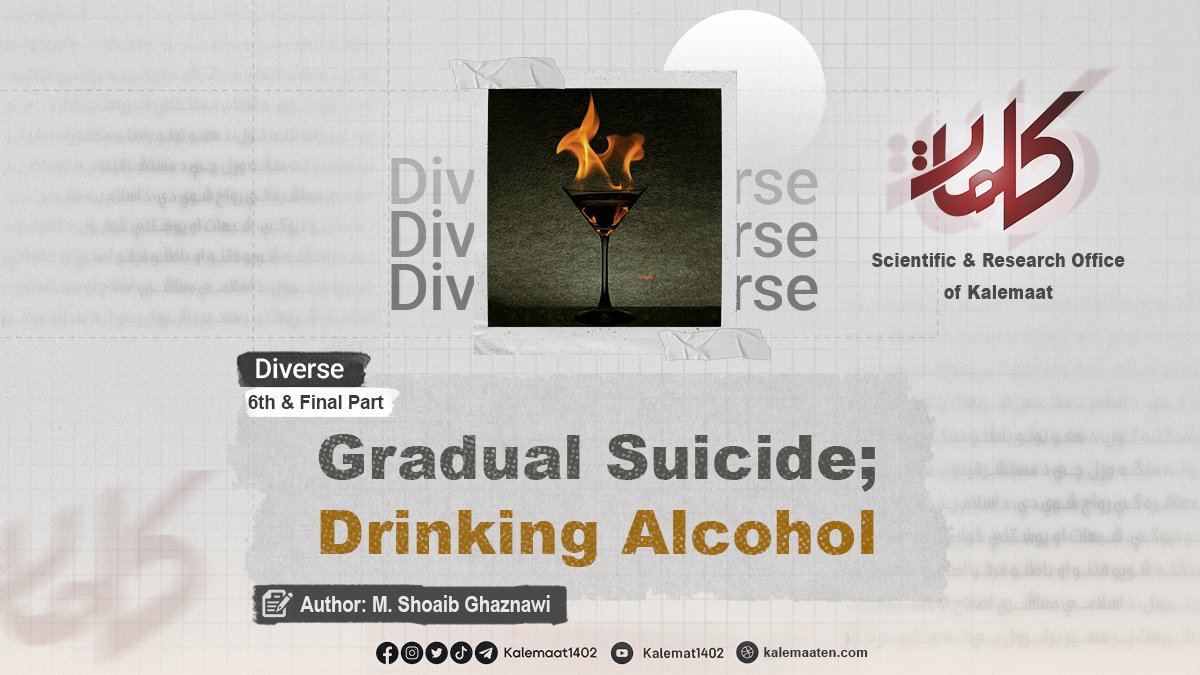Author: M. Shoaib Ghaznawi
Gradual Suicide; Drinking Alcohol (the 6th and final part)
Preventive Factors Against Deviations
-
Teaching Faith and Belief
As soon as a child begins to speak, parents are responsible for instilling both faith (iman) and practical religious habits in them.
-
Teaching the Phrase (La ilaha illallah)
The Prophet Muhammad (peace be upon him) said: “Open the first word to your children as La ilaha illallah” [1].
This means that the first word taught to a child should be La ilaha illallah so that the truth of this declaration takes root in their heart and becomes the foundation of their life. Every future word and action of the child should align with the principles of La ilaha illallah.
Once the child recognizes right from wrong, parents should teach them what is halal and haram, so they understand which paths, words, and actions are permissible and which must be avoided forever.
-
Teaching Prayer (Salat)
When a child reaches seven years of age, parents must encourage them to perform prayer. By age ten, they should enforce discipline for neglecting prayer. The Prophet (peace be upon him) said: “Command your children to pray when they are seven years old, and discipline them for it when they are ten years old” [2].
Parents should also accustom children to attend the mosque and perform congregational prayer, because if children neglect prayer in childhood, it becomes much harder to instill in adulthood. Children who neglect prayer tend to be negligent in other aspects of life as well.
-
Teaching Good Manners and Ethics
Parents and educators must instill good manners and ethical behavior from the earliest days. The Prophet (peace be upon him) said: “No parent has given a child a better gift than good manners” [3].
Simultaneously, parents must prevent bad behavior, including:
-
lying, stealing, cursing, swearing, recklessness, wandering, anger, jealousy, backbiting, slander, greed, indecency, immodesty, gossip, disobedience, mocking, disrespect, shouting, or aggression.
Practical steps include:
-
Do not fulfill every childish whim, to avoid spoiling the child.
-
Discourage overeating.
-
Prevent wasting time on unproductive activities.
-
Limit TV watching to avoid time-wasting and health risks.
-
Discourage association with lazy or mischievous children.
-
Teach the child to read the Qur’an first.
-
Encourage early sleep after Isha and early rising.
-
Teach table manners, social etiquette, greeting etiquette, and personal hygiene.
-
Instill humility and modesty.
-
Praise children for good deeds.
-
Teach children to take care of their belongings.
-
Mothers should instill respect for the father.
-
Parents must never argue in front of the child.
-
Introduce some manual skills early on.
-
Engage children in age-appropriate activities to instill respect for work and responsibilities.
-
Encourage reading of useful books.
-
Teach the sacrifices and services of the Prophet Muhammad (peace be upon him), his companions, and scholars of Islam.
-
Introduce great historical and contemporary figures and their contributions.
-
Raise children physically and mentally strong and energetic.
-
Encourage sports like running, archery, swimming, and horseback riding to prepare them for defending Islam. [4]
Recognize Your Duty as a Muslim
If our ancestors had not initiated cultural and scientific movements, the names of geniuses and scholars would not have been celebrated across centuries, nor would civilization have recognized their achievements. A few notable figures include:
-
Imams Abu Hanifa, Malik, Shafi’i, Ahmad ibn Hanbal – leaders in Islamic jurisprudence.
-
Abu Bakr Zakariya al-Razi – pioneering physician and pharmacist.
-
Abu al-Qasim al-Zahrawi – leading surgeon.
-
Ibn Khaldun – historian and sociologist.
-
Avicenna (Ibn Sina) – philosopher and physician.
-
Abu Zakariya al-Awwam – botanist.
-
Al-Khwarizmi – mathematician and astronomer.
-
Alhazen (Ibn al-Haytham) – physicist and expert in optics.
-
Al-Ghazali – scholar and spiritual reformer.
-
Muhammad ibn Qasim – conqueror of Sindh at 17.
-
Sultan Mehmed the Conqueror – captured Constantinople at 24.
-
Salahuddin Ayyubi (Saladin) – liberated Jerusalem.
Thousands of other scholars, warriors, and thinkers have left a lasting mark, acknowledged even by Western scholars.
Call to Action for Muslim Youth
Muslim youth should:
-
Revive the legacy of their ancestors.
-
Take initiative in religious, scholarly, cultural, and intellectual pursuits.
-
Present their talent and creativity to the world to honor their forebears.
It is tragic to waste a lifetime in alcohol addiction, sacrificing your health, youth, family, and honor.
Return to faith, worldly and spiritual happiness, and physical and mental health. Show mercy to your youth, health, children, and parents, who pray for your deliverance from the trap of alcohol.
May we witness a society free from alcohol and alcoholics.
Continues…
Previous Part
References:
- Qur’an.
- Sunan Abu Dawud, Sulayman ibn al-Ash’ath Abu Dawud al-Sijistani al-Azdi, Dar al-Fikr.
- Musannaf Ibn Abi Shaybah, Abu Bakr ibn Abi Shaybah, Abdullah ibn Muhammad ibn Ibrahim ibn Uthman ibn Khawsti al-Absi, Maktabat al-Rushd – Riyadh.
- Al-Mu’jam al-Awsat, Sulayman ibn Ahmad ibn Ayyub ibn Muteer al-Lakhmi al-Shami, Abu al-Qasim al-Tabarani, Dar al-Haramayn – Cairo.
- Sunan Ibn Majah, Ibn Majah Abu Abdullah Muhammad ibn Yazid al-Qazwini, Dar Ihya al-Kutub al-Arabiya – Faisal Isa al-Babi al-Halabi.
- Shu’ab al-Iman, Ahmad ibn al-Husayn ibn Ali ibn Musa al-Khusrawjirdi al-Khorasani, Abu Bakr al-Bayhaqi, Maktabat al-Rushd – Riyadh.
- Musnad Imam Ahmad ibn Hanbal, Abu Abdullah Ahmad ibn Muhammad ibn Hanbal ibn Hilal ibn Asad al-Shaybani, Mu’assasat al-Risala.
- Mahmoud al-Fatawi, by Allama Mufti Khudanazar (may Allah have mercy).
- Tarbiyat wa Islah al-Furud, by Hazrat Maulana Mufti Qasim Qasimi (may Allah protect him).
- Loghatnameh Dehkhoda, Ali Akbar Dehkhoda, p. 52.
- Protect Youth from the Corruption of Addiction, Sheikh Muhammad Ali Khalidi.
- Tahlili dar Falsafeh Ahkam, Muhammad Saleh Saeedi.
- Regime-e Tandurusti, Dr. Safdar Sanei.
-
The Effects of Alcoholic Beverages from the Perspective of Medical Science and Western Scholars, Dr. Ali Asghar Akbari.



